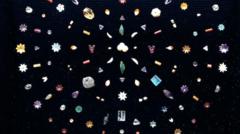On Wednesday, a collection of spectacular jewels associated with the remains of Buddha will be auctioned at Sotheby’s in Hong Kong, raising a myriad of ethical considerations concerning their sale. Touted as one of the most remarkable archaeological discoveries, these items, including approximately 1,800 pearls, rubies, sapphires, and gold sheets, have been in private possession since their discovery in 1898 in Piprahwa, India.
The relics, unearthed from a stupa, include not only valuable gemstones but also bone fragments attributed to the Buddha, leading to their classification as culturally and historically significant artifacts. Nicolas Chow, the chairman of Sotheby's Asia and head of Asian Art, commented on their importance, suggesting that they may represent "one of the most extraordinary archaeological discoveries of all time."
However, as these jewels transition from being private treasures to auction items, they spark a serious debate about whether their sale is appropriate, given their deep ties to India's rich spiritual and cultural heritage. Art historian Naman Ahuja questioned the morality of commercializing such sacred objects and posited that the jewels should instead be preserved for public reverence.
The history behind these jewels is also steeped in colonial complexities. William Claxton Peppé, the estate manager who discovered the relics, handed them over to the colonial Indian government, while his family retained a portion labeled as "duplicates." The current custodian, Chris Peppé, insists that their longstanding history and research justify the decision to auction rather than donate them, claiming that no viable donation options remained.
A broad spectrum of Buddhist leaders and scholars have voiced their discontent regarding the implications of selling such sacred items. Amal Abeyawardene from the British MahaBodhi Society highlighted the incongruity of profiting from relics that belong to the Buddha's lineage, originally intended to be eternally venerated by his followers.
Critics include experts from Soas University of London, who emphasized the ethical dilemma surrounding the commodification of human remains. They argue that intertwining these precious jewels with Buddha's bones complicates any simple narrative of ownership. The significance of these items transcends mere monetary value; they embody a cultural legacy that people worldwide consider integral to Buddhist faith and heritage.
The Peppé family has conducted thorough evaluations regarding the relics, admitting to both the historical colonial context and the ongoing dialogue about ownership and repatriation. With the sale scheduled, many ponder a future that could see these once-hidden treasures either integrated back into Buddhist cultural rituals or continued in private ownership, serving as a stark reminder of the ongoing tensions between commerce and cultural heritage preservation.
The forthcoming auction reflects not just a chance to acquire extraordinary gems, but it also underscores the enduring conversations about legacy, custodianship, and the ethical dimensions surrounding sacred artifacts in a post-colonial world.



















